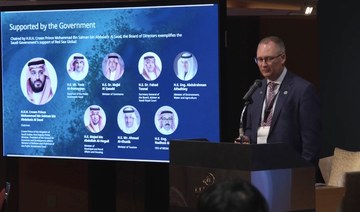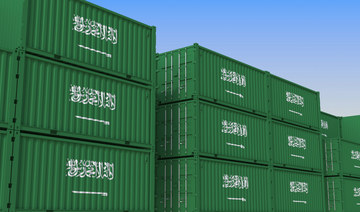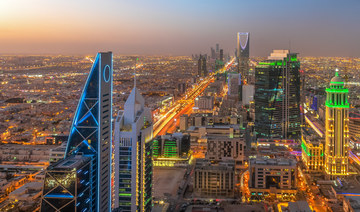RIYADH: Saudi Arabia’s non-oil private sector showcased robust growth in June, driven by increased demand, higher output levels, and a rise in employment, according to a report.
The latest S&P Global Purchasing Managers’ Index showed that the Riyad Bank Saudi Arabia PMI stabilized at 55 from 56.4 in May, marking the lowest reading since January 2022.
Despite the slowdown in new orders, which saw the slowest growth in nearly two and a half years, non-oil businesses reported a substantial rise in output, helping the Kingdom led the region with the strongest expansion figures.
Companies boosted their production levels to support ongoing sales and projects, reflecting a positive business environment.
Naif Al-Ghaith, chief economist at Riyad Bank, said: “The PMI for the non-oil economy recorded at 55.0 in June, marking the slowest pace of expansion since January 2022. The new orders component fell compared to the previous month, suggesting a slight moderation in demand growth.”
He added: “However, the growth in non-oil sectors was supported by a strong increase in output levels. Employment numbers also rose, while suppliers’ delivery times continued to improve.”
The second quarter growth figures indicate a positive outlook for Saudi Arabia’s non-oil gross domestic product, with expected gains exceeding 3 percent.
High output levels, stable supply chains, and moderate job creation point toward a resilient and expanding non-oil economy, contributing to the country’s economic diversification efforts.
Saudi Arabia is actively diversifying its economy under Vision 2030, attracting global investments in technology and tourism through initiatives like NEOM.
The Kingdom has also opened up its tourism sector with projects such as the Red Sea and Al-Ula, while cultural events and industrial programs like the National Industrial Development and Logistics Program stimulate economic growth.
Concurrent financial reforms and investments in renewable energy reduce oil dependence. These efforts are complemented by measures to support SMEs and enhance education, preparing the workforce for new economic sectors and underscoring Saudi Arabia’s commitment to transformation.
UAE
The UAE’s non-oil private sector continued to grow in June, though the rate of expansion slowed. The S&P Global UAE PMI fell to 54.6 from 55.3 in May, the lowest point in 16 months.
The decline was primarily due to sustained competitive pressures, weaker job creation, and an easing in output growth.
The sector faced challenges with rising input prices, leading to the quickest increase in average prices charged since April 2018.
Despite these issues, businesses saw a marked increase in new work, with the strongest rise in new orders since March. Export volumes also saw a significant boost, reaching the highest levels since October 2023.
David Owen, senior economist at S&P Global Market Intelligence, noted: “The UAE PMI highlights a slowing growth trend in the non-oil sector throughout 2024 so far. Nevertheless, companies are still enjoying strong customer demand and robust sales pipelines, which are sustaining output expectations and driving purchasing activity.”
Owen added: “On the negative side, input price pressures are at their strongest for nearly two years, causing firms to raise their output prices for the second month in a row.”
The ongoing strength in demand and sales indicated a resilient market despite the external pressures and challenges faced.
In recent months, the UAE has initiated several projects to boost its non-oil sector. For example, the Dubai Industrial Strategy 2030 aims to increase the total output and value-addition of the manufacturing division, and enhance the depth of knowledge and innovation, making Dubai a preferred manufacturing platform for global businesses.
Additionally, Abu Dhabi’s Ghadan 21 program continues to invest in economic infrastructure projects and initiatives that support and transform the emirate’s economy, knowledge ecosystem, and communities.
Qatar
Qatar’s non-energy private sector witnessed significant growth in June, marking the fastest expansion in nearly two years, according to the latest Purchasing Managers’ Index survey data from the Qatar Financial Centre compiled by S&P Global.
The PMI, which rose for the fifth time this year, reached a 23-month high, driven by increased activity and a surge in new business.
In June, the PMI hit 55.9, up from 53.6 in May, indicating the most substantial improvement in non-energy private sector conditions since July 2022.
Output increased at the fastest rate in a year and a half, with notable growth in the manufacturing and construction sectors.
The level of new incoming work expanded at the quickest rate in 13 months, bolstered by higher customer numbers and effective promotional activities.
Employment growth continued for the sixteenth consecutive month, reflecting the ongoing business expansion and the need for highly skilled staff.
Despite the rising demand, inflationary pressures remained muted, with only slight increases in input prices since May and a reduction in fees charged for goods and services.
Companies were optimistic about the 12-month outlook, attributing positive forecasts to the latest branch openings, new customers, and marketing campaigns.
Qatar has boosted its non-oil sector through initiatives such as investing in infrastructure and industrial development, promoting tourism and hospitality, and establishing free zones, all of which aim to diversify the economy away from reliance on oil and gas revenues.
Kuwait
Kuwait’s non-oil private sector displayed solid growth in June, with the S&P Global Kuwait PMI at 51.6, slightly down from 52.4 in May.
The index remained above the neutral 50 mark for the 17th consecutive month, signaling continued improvement in business conditions.
Employment in the sector rose at the fastest pace on record, driven by sustained new orders and increased output. Despite sharp rises in input costs, the rate of inflation eased for the third month, allowing firms to limit price increases for customers.
Businesses in Kuwait faced input cost inflation, but the rate of increase in input prices eased from the peaks seen earlier in the year.
Andrew Harker, economics director at S&P Global Market Intelligence, said: “Sustained inflows of new orders encouraged companies to expand their staffing levels at the sharpest pace on record in June.”
Companies were able to manage these costs better, resulting in moderate price increases for their goods and services.
“There were more signs of input cost inflation softening, enabling companies to continue their policy of limiting price rises to customers in order to help secure new work. One of the big drivers of rising expenses was spending on advertising, which has often been central to growth in the non-oil private sector in recent months,” Harker added.
Kuwait has been actively working to diversify its economy through initiatives such as the Kuwait National Development Plan, which aims to transform Kuwait into a financial and trade hub regionally and internationally. Recent projects include “Madinat al-Hareer,” or the Silk City, and the expansion of Mubarak Al Kabeer Port.
Global overview
In June, the US PMI for the non-manufacturing sector was at 51.6, indicating moderate growth. China’s Caixin Services PMI stood at 51.2, down from 54 in May.
The HCOB Germany Services PMI Business Activity Index, which is derived from a question on changes in business activity from the previous month, reached 53.1 in June.
This marks the fourth consecutive month above the 50 no-change threshold, indicating a solid expansion rate.
However, it is a slight decrease from May’s 12-month high of 54.2, marking the first decline in the index since January.
Japan’s services PMI, on the other hand, stood at 49.4 in June from 53.8 in May.
These comparisons underscore the Gulf region’s relatively strong performance, particularly Saudi Arabia’s leading position with a PMI of 55.
Despite facing some headwinds, the non-oil sectors in these Gulf countries continue to show resilience and robust growth, which bodes well for their economic diversification efforts.
The Purchasing Managers’ Index, produced globally by S&P Global and some local trade associations, is a survey-based economic indicator designed to provide timely insights into business conditions.
It includes individual measures such as business output, new orders, employment costs, and selling prices, as well as exports, purchasing activity, supplier performance, backlogs of orders, and inventories of both inputs and finished goods.
By asking respondents to report changes compared to the previous month and their sentiment on future output, the PMI anticipates changing economic trends and can serve as an alternative gauge to official data, which can be delayed or suffer from quality issues.
Initially focused on manufacturing, its coverage now extends to services, construction, and retail sectors.























